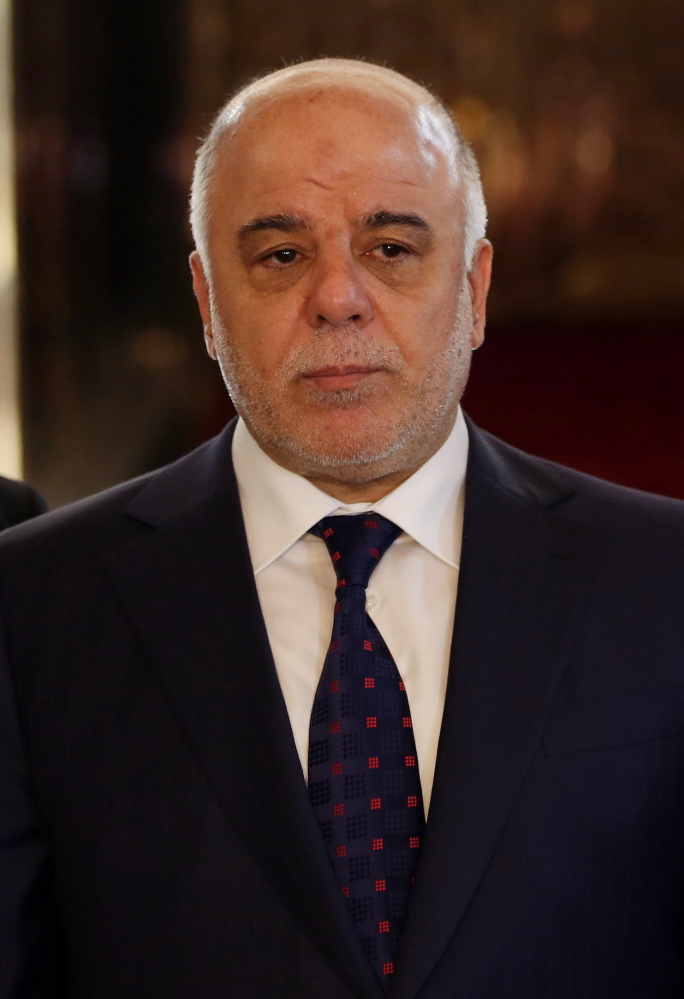WASHINGTON — When Iraqi Prime Minister Haider al-Abadi sits down in the Oval Office on Tuesday, he is expected to ask President Obama to boost U.S. military assistance to help his beleaguered government push Islamic State militants out of Iraq.
But Obama will be seeking assurances that al-Abadi will rein in the Shiite Muslim militias that helped Iraqi forces drive militants out of Tikrit and other towns in recent weeks, but then carried out reprisals against some Sunni Muslim residents, according to an administration official briefed on the visit.
Al-Abadi is making his first visit to Washington since Obama sent U.S. troops and aircraft back to Iraq in August to help degrade and defeat the Islamic State. The two leaders met in September at the United Nations in New York.
U.S. support for al-Abadi’s government has grown steadily since then and is likely to increase as the war against Islamic State intensifies.
U.S. Special Forces soldiers helped identify Iraqi military units that could be retrained and rearmed after tens of thousands of troops abandoned their posts and fled during Islamic State’s blitz into western and northern Iraq last year.
U.S.-Iraqi military operations centers were set up in Baghdad and Irbil, capital of the Kurdish region of Iraq. American soldiers are training Iraqi forces at four bases in the country.
The U.S. also has provided Iraq with 100 million rounds of ammunition, 62,000 small weapons, 1,700 Hellfire air-to-ground missiles and 300 mine-resistant armored personnel carriers. Iraqi pilots are training on F-16 fighter jets at a U.S. Air National Guard airfield near Tucson, Arizona.
The closer military and political relationship with Washington marks a sea change from the tenure of al-Abadi’s predecessor, Nouri al-Maliki, who kept the Obama administration at arm’s length.
After he took office in September, al-Abadi came under pressure from U.S. diplomats to fire military officers who the U.S. said were incompetent or openly corrupt. In November, al-Abadi replaced 36 Iraqi commanders.
Last month, when Iranian-backed militias had stalled in their assault to retake Tikrit, al-Abadi telephoned Vice President Joe Biden.
“When I spoke with him,” Biden recalled in a speech at National Defense University last week, “he made it clear that he wanted the United States and the coalition engaged ‘all over Iraq,’ was his phrase.”
U.S. warplanes, which had not played a role in the Tikrit assault, soon began pounding Islamic State positions around the city. The militants’ defenses collapsed within days and Iraqi forces retook the city.
Josh Earnest, the White House press secretary, said Monday that he’s not aware of specific requests that al-Abadi is bringing. But he added, “If there are specific ideas that Prime Minister Abadi has for stepped-up assistance, then we’ll obviously consider them seriously.”
The administration has “obviously been very supportive of his efforts, both diplomatically, but also in terms of providing support and assistance to Iraqi security forces,” Earnest said. “And we anticipate that that partnership and that support will continue.”
Send questions/comments to the editors.



Success. Please wait for the page to reload. If the page does not reload within 5 seconds, please refresh the page.
Enter your email and password to access comments.
Hi, to comment on stories you must . This profile is in addition to your subscription and website login.
Already have a commenting profile? .
Invalid username/password.
Please check your email to confirm and complete your registration.
Only subscribers are eligible to post comments. Please subscribe or login first for digital access. Here’s why.
Use the form below to reset your password. When you've submitted your account email, we will send an email with a reset code.